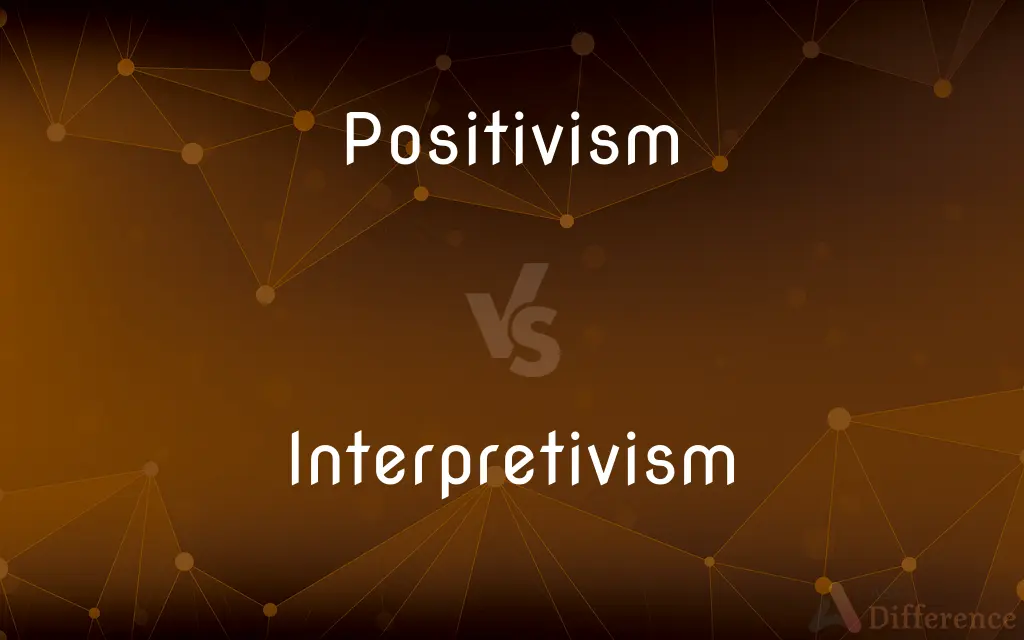Positivism vs. Interpretivism — What's the Difference?
Edited by Tayyaba Rehman — By Fiza Rafique — Updated on October 5, 2023
Positivism believes in observable, objective truths, while Interpretivism focuses on subjective interpretation and human experience.

Difference Between Positivism and Interpretivism
Table of Contents
ADVERTISEMENT
Key Differences
Positivism is an epistemological perspective and methodology which asserts that all genuine knowledge is derived from sensory experience. Interpretivism, on the other hand, contends that meaningful social actions cannot be reduced to objective facts but must be interpreted from the perspective of the individuals involved.
Positivism typically employs quantitative methods, believing that the world operates according to immutable laws. Interpretivism, in contrast, leans towards qualitative methods, asserting that reality is socially constructed and can vary from person to person.
Positivism argues for a value-free and objective approach in research, maintaining that researchers can be detached observers. Interpretivism suggests that research can never be fully objective, as researchers bring their own backgrounds and perspectives to their work.
Positivism holds that knowledge is generated from empirical evidence gathered through direct observation and experimentation. Interpretivism believes that knowledge is constructed through interpretations of the world, based on individual experiences and interactions.
In Positivism, the role of the researcher is to discover and describe facts. Within Interpretivism, the researcher seeks to understand and interpret the meanings people assign to their experiences.
ADVERTISEMENT
Comparison Chart
Nature of Reality
Objective and singular.
Subjective and multiple.
Research Approach
Quantitative.
Qualitative.
Source of Knowledge
Empirical evidence.
Individual experiences & meanings.
Researcher's Role
Detached observer.
Engaged and interpretive.
Underlying Belief
World operates based on immutable laws.
Reality is socially constructed.
Compare with Definitions
Positivism
The view that only scientific knowledge is valid and reliable.
His positivism led him to dismiss the anecdotes as mere stories without concrete evidence.
Interpretivism
A belief that knowledge is constructed through human interpretation and interaction.
Her interpretivism led her to study the personal narratives of her subjects closely.
Positivism
A belief in empirical and observable facts as the foundation of knowledge.
The scientist's positivism drove her to rely solely on measurable data in her study.
Interpretivism
An approach favoring qualitative methods to understand human behavior and experiences.
His interpretivism drove him to conduct in-depth interviews instead of surveys.
Positivism
An approach emphasizing the importance of objectivity and detachment in research.
Her positivism ensured she remained impartial while collecting data for her project.
Interpretivism
A stance that values the meanings individuals assign to their own experiences.
From an interpretivism standpoint, personal stories carry rich insights about societal dynamics.
Positivism
A philosophy asserting the world operates based on fixed laws.
Due to his strong positivism, he sought patterns and regularities in every phenomenon.
Interpretivism
The view that social reality is shaped by human beliefs, actions, and interactions.
According to interpretivism, our cultural backgrounds influence how we perceive the world.
Positivism
The rejection of metaphysics in favor of empirical sciences.
Positivism shuns speculative thought, favoring what can be directly observed and tested.
Interpretivism
A philosophy asserting that reality is socially constructed and subjective.
Interpretivism recognizes that two people can experience the same event differently.
Positivism
Positivism is a philosophical theory that holds that all genuine knowledge is either positive—a posteriori and exclusively derived from experience of natural phenomena and their properties and relations—or true by definition, that is, analytic and tautological. Thus, information derived from sensory experience, as interpreted through reason and logic, forms the exclusive source of all certain knowledge.Verified data (positive facts) received from the senses are known as empirical evidence; thus positivism is based on empiricism.Sociological positivism holds that society, like the physical world, operates according to general laws.
Interpretivism
Antipositivism
Positivism
A doctrine contending that sense perceptions are the only admissible basis of human knowledge and precise thought.
Interpretivism
Qualitative research
Positivism
The application of this doctrine in logic, epistemology, and ethics.
Interpretivism
A school of cultural anthropological thought founded by Franz Boas.
Positivism
The system of Auguste Comte designed to supersede theology and metaphysics and depending on a hierarchy of the sciences, beginning with mathematics and culminating in sociology.
Interpretivism
(legal) A school of thought holding that law is not a set of given data, conventions, or physical facts, but what lawyers aim to construct or obtain in their practice.
Positivism
Any of several doctrines or viewpoints, often similar to Comte's, that stress attention to actual practice over consideration of what is ideal
"Positivism became the 'scientific' base for authoritarian politics, especially in Mexico and Brazil" (Raymond Carr).
Positivism
The state or quality of being positive.
Positivism
(philosophy) A doctrine that states that the only authentic knowledge is scientific knowledge, and that such knowledge can only come from positive affirmation of theories through strict scientific method, refusing every form of metaphysics.
Positivism
(legal) A school of thought in jurisprudence in which the law is seen as separated from moral values; i.e. the law is posited by lawmakers (humans).
Positivism
A system of philosophy originated by M. Auguste Comte, which deals only with positives. It excludes from philosophy everything but the natural phenomena or properties of knowable things, together with their invariable relations of coexistence and succession, as occurring in time and space. Such relations are denominated laws, which are to be discovered by observation, experiment, and comparison. This philosophy holds all inquiry into causes, both efficient and final, to be useless and unprofitable.
Positivism
The form of empiricism that bases all knowledge on perceptual experience (not on intuition or revelation)
Positivism
A quality or state characterized by certainty or acceptance or affirmation
Common Curiosities
What research methods are favored by Positivists?
Positivists typically prefer quantitative methods like experiments and surveys.
How does Interpretivism view reality?
Interpretivism sees reality as socially constructed and subjective.
How do Interpretivists gather data?
Interpretivists often use qualitative methods like interviews and participant observation.
Are Positivism and Interpretivism compatible?
Generally, they represent opposing epistemological stances, but some researchers combine elements of both.
Is Positivism more scientific than Interpretivism?
Positivism aligns more with traditional scientific methods, but both approaches contribute valid insights in research.
How does Interpretivism perceive the role of the researcher?
Interpretivism believes researchers are engaged and interpretive, bringing their own perspectives to the study.
What is the core belief of Positivism?
Positivism believes in empirical, observable facts as the primary source of knowledge.
Why is Interpretivism important in social sciences?
It values human experiences, considering the meanings people assign to their interactions.
Can Positivism address human emotions effectively?
Due to its emphasis on objective facts, Positivism might not delve deeply into subjective human emotions.
How can Interpretivism aid in understanding culture?
Interpretivism delves into individual experiences, offering deep insights into cultural dynamics and beliefs.
What challenges can arise with Positivism in social research?
It might overlook deeper, subjective aspects of human experiences due to its focus on objective facts.
Is Positivism objective?
Positivism aims for objectivity, emphasizing empirical evidence and detachment.
Can Interpretivism provide definitive answers?
Interpretivism often yields multiple perspectives and interpretations, rather than definitive answers.
Why might some researchers critique Interpretivism?
Some argue that it's too subjective, making its findings less generalizable or definitive.
How does Positivism view metaphysics?
Positivism generally rejects metaphysical claims, focusing on empirical sciences.
Share Your Discovery

Previous Comparison
Hedging vs. Speculation
Next Comparison
Shame vs. EmbarrassmentAuthor Spotlight
Written by
Fiza RafiqueFiza Rafique is a skilled content writer at AskDifference.com, where she meticulously refines and enhances written pieces. Drawing from her vast editorial expertise, Fiza ensures clarity, accuracy, and precision in every article. Passionate about language, she continually seeks to elevate the quality of content for readers worldwide.
Edited by
Tayyaba RehmanTayyaba Rehman is a distinguished writer, currently serving as a primary contributor to askdifference.com. As a researcher in semantics and etymology, Tayyaba's passion for the complexity of languages and their distinctions has found a perfect home on the platform. Tayyaba delves into the intricacies of language, distinguishing between commonly confused words and phrases, thereby providing clarity for readers worldwide.
















































